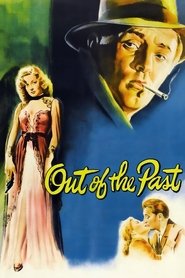— And then she'd come along like school was out and everything else was just a stone you sailed at the sea.
Even better a second time round. A noir transposed from the usual polluted city environment into the open Californian countryside, yet it remains as morally fuggy as the asphalt jungle from whence it came. I truly love the dialogue ("Keep the martini's dry, I'll be back"), but it's followed through by a relatively rich symbolic language as well. The cigarettes and their attendant smoke evince a befogged sense of morality that they seem to generate themselves, and they even permit of a few jokes throughout the runtime. And the near-inscrutable deaf-dumb boy is worthy of an essay in itself, as-is Kathie's reappearance at Whit's mansion.
Every viewer knows that the impure Jeff could never reach the Promised Land represented by Ann, and we must assume the boy is deliberately lying to Ann. But the real question is whether Ann, deep down, actually believes him in turn. It's certainly what she wants to hear, but is she now starting her life on something that she will deep down always feel is suspect? What would your life be like if your moral foundations were really not as stable as you thought they were? And isn't this just like post-War America?
In the film, the rustic setting is in service to the cinematography. Ravines, with brooks at the bottom, make for rugged framing devices, with a depth of field that suggests you, too, from your couch or theater seat could cast a fly into the water, or sneak up on some would-be assassin from behind a clump of rocks. Nature is pictorial here, but in the book, nature is psychological, a reflection on internal states, with what ought to be beautiful undercut and vitiated: “Lightning repeatedly slit the cloudbanks and the rain seemed to come down faster, as though it was pouring through the holes made by the ragged blades of light.” This is a language suggestive of rape at worst, and non-consent at best, which is not good at all.
— Colin Fleming (Los Angeles Review of Books)
The narration ends midway through the film, as soon as Mitchum finishes recounting his past to Huston. The result is that the film is suddenly open to new possibilities--will Mitchum die? will he find happiness with Huston, or passion with Greer?--even as the cold feeling of predestination lingers. This, too, heightens the emotional stakes of the film and enables it to transcend the ironic detachment that generally characterizes the genre.[…]
Mitchum's serene comfort within his own skin, is evident in nearly every frame of Out of the Past, so much so that even the script takes note. "You just sit and stay inside yourself," Douglas notes upon first meeting Mitchum. "You wait for me to talk. I like that." This ability to observe quietly is perhaps the essential characteristic of the noir protagonist [and] another reason for the prevalence of voiceover in the genre: Just because the hero frequently declines to speak doesn't mean that he is without clever things to say.
— Christopher Orr (The Atlantic)
There have been double- and triple-crosses in many of these tough detective films, and in one or two Humphrey Bogart specials they have run even higher than that. But the sum of deceitful complications that occur in Out of the Past must be reckoned by logarithmic tables, so numerous and involved do they become. [If] only we had some way of knowing what's going on in the last half of this film, we might get more pleasure from it. As it is, the challenge is worth a try.
— Bosley Crowther (New York Times, 1947)

